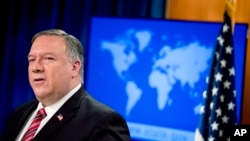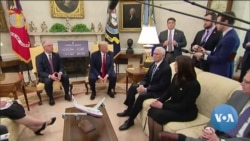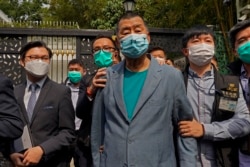With the State Department soon to release its report assessing Hong Kong’s autonomy, the United States has expressed concern about what it sees as China’s heavy hand in Hong Kong.
“We continue to monitor with growing concern Beijing's increasing efforts to interfere with Hong Kong's governance. The erosion of Hong Kong's freedoms is inconsistent with the promises that the Chinese Communist Party itself made under 'one country, two systems,' ” U.S. Secretary of State Mike Pompeo said during a news briefing Wednesday.
"Any effort to impose draconian national security legislation on Hong Kong would be inconsistent with Beijing's promises and would impact American interests there,” he told reporters.
Pompeo’s remarks came as the State Department was due to submit a report to Congress on the U.S. assessment of Hong Kong’s autonomous status. A U.S. law requires the State Department to certify that Hong Kong retains enough autonomy to justify the favorable U.S. trading terms that have helped it maintain its position as a world financial center.
Political tensions have escalated in Hong Kong after Beijing's top representative office in the city said it was not bound by a law that restricts interference by other mainland Chinese agencies in the former British colony.
Two systems
Hong Kong returned to Beijing in 1997 under the “one country, two systems” framework that granted the city broad freedoms not seen in mainland China.
In recent weeks, Hong Kong’s law enforcement authorities arrested 15 pro-democracy activists, including Martin Lee, 81, a move the U.S. condemned.
China has rejected the criticism, saying the U.S. is interfering in China's internal affairs.
“Hong Kong's affair is purely China's domestic affair,” said Geng Shuang, a spokesperson at the Chinese Ministry of Foreign Affairs.
Tuesday, a group of Democratic and Republican U.S. lawmakers said the U.S. “must take a leadership role in addressing Beijing’s threats to Hong Kong’s autonomy.”
“Failing to address Beijing’s efforts to erode Hong Kong’s autonomy will undermine the freedom and human rights of its people, its valuable role as a partner to the United States, and its unique role in the international economy,” the bipartisan group said in a letter addressed to Pompeo.
Pandemic issues
The United States and China have also been trading sharp accusations over the handling of the COVID-19 pandemic.
“We still haven't gained access. The world hasn't gained access to the WIV, Wuhan Institute of Virology,” said Pompeo, adding that other nations should understand how the coronavirus originated in Wuhan, China, while questioning the safety of other Chinese labs over risks.
“There are multiple labs that are continuing to conduct work, we think, on contagious pathogens inside China today," the U.S. secretary of state said. "We don’t know if they are operating at a level of security to prevent this from happening again.”
Relations between the U.S. and China have deteriorated since the COVID-19 outbreak, which as of Wednesday afternoon EDT had killed more than 226,000 people worldwide, according to Johns Hopkins University statistics.







